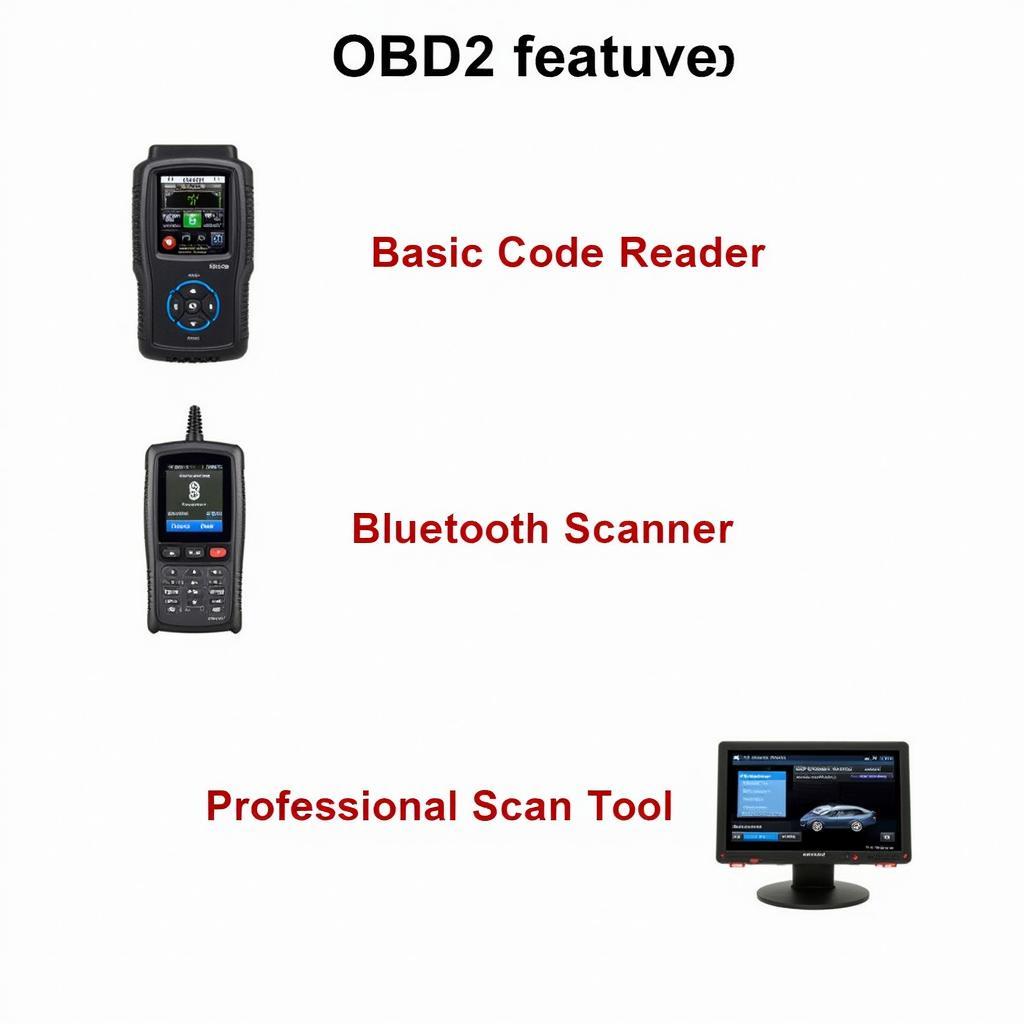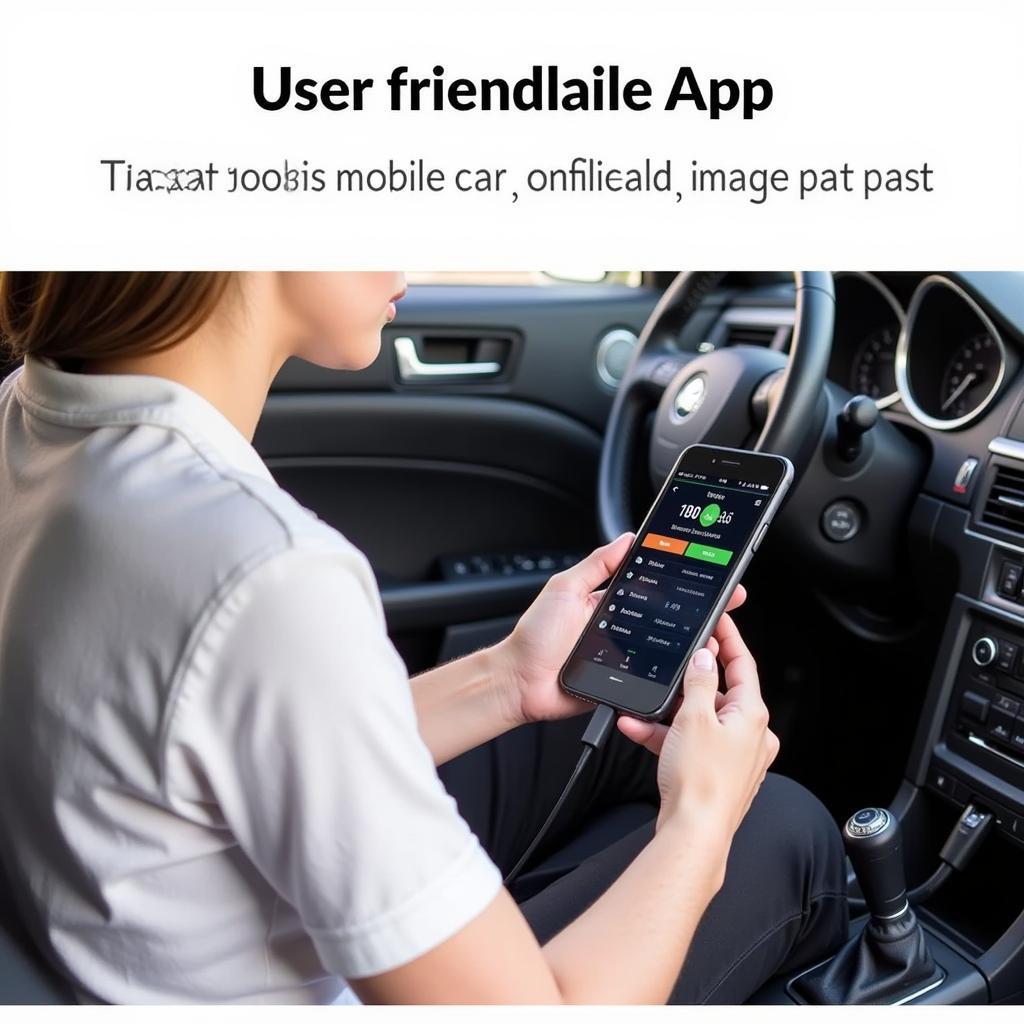Your cart is currently empty!

How to Buy the Best OBD2 Scanner for Your Needs
Buying an OBD2 scanner used to be a straightforward affair, but the market has exploded with options. This can be overwhelming, especially if you’re unsure what to look for. This guide will walk you through everything you need to know about how to buy an OBD2 scanner, from understanding the basics to choosing the right features for your needs.
Understanding OBD2 Scanners: A Quick Overview
Before we dive into the buying process, let’s cover the basics. An OBD2 scanner (On-Board Diagnostics) is a device that plugs into your car’s OBD2 port (usually located under the steering wheel) and communicates with its computer. This allows you to read and sometimes clear diagnostic trouble codes (DTCs), which can indicate engine problems, emissions issues, and more.
 Types of OBD2 Scanners
Types of OBD2 Scanners
Why Buy an OBD2 Scanner?
You might be wondering, “Do I really need an OBD2 scanner?” The answer depends on how much you want to be involved in your car’s maintenance and potential repairs. Here are some compelling reasons why owning one can be beneficial:
- Save Money on Repairs: Diagnosing car problems early can save you big bucks on costly repairs down the line.
- Gain Control Over Your Car’s Health: An OBD2 scanner gives you insight into what’s happening under the hood, allowing you to make informed decisions about your car’s care.
- DIY Diagnostics and Repairs: For the mechanically inclined, an OBD2 scanner empowers you to troubleshoot and potentially fix minor issues yourself.
- Check Used Car History: An OBD2 scanner can help you identify potential problems before purchasing a used car, giving you peace of mind.
- Clear Check Engine Light: While not a solution in itself, an OBD2 scanner lets you understand why your check engine light is on and potentially reset it.
Types of OBD2 Scanners: Finding the Right Fit
There are several types of OBD2 scanners available, each with varying levels of functionality and cost:
- Basic Code Readers: These entry-level scanners are budget-friendly and can read and clear basic engine codes. They are a good starting point for beginners.
- Bluetooth OBD2 Scanners: These scanners connect to your smartphone or tablet via Bluetooth, allowing you to access more advanced features and data through dedicated apps.
- Professional-Grade Scan Tools: These high-end scanners offer comprehensive diagnostics, advanced features (like live data streaming), and are typically used by professional mechanics.
 Choosing the Right OBD2 Scanner
Choosing the Right OBD2 Scanner
Key Features to Consider When Buying an OBD2 Scanner
With so many options available, it’s important to consider the features that matter most to you:
- Vehicle Compatibility: Ensure the scanner is compatible with your car’s make, model, and year.
- Code Reading and Clearing: This is the primary function, so make sure the scanner can read and clear codes for the systems you need (engine, transmission, ABS, airbag, etc.).
- Live Data Streaming: This feature allows you to view real-time data from your car’s sensors, which can be helpful for diagnosing intermittent problems or monitoring sensor performance.
- Additional Features: Some scanners offer extras like smog test readiness checks, battery voltage readings, and freeze frame data (a snapshot of your car’s systems when a fault code was stored).
- User Interface and Ease of Use: Choose a scanner with a clear, intuitive interface that you find easy to navigate and understand.
Where to Buy an OBD2 Scanner
OBD2 scanners can be purchased from a variety of retailers, both online and offline:
- Auto Parts Stores: Brick-and-mortar stores like AutoZone, O’Reilly Auto Parts, and Advance Auto Parts carry a selection of scanners.
- Online Retailers: Amazon, eBay, and dedicated automotive websites offer a wider variety of scanners, often at competitive prices.
- Direct from Manufacturers: Some manufacturers, like BlueDriver and Autel, sell scanners directly through their websites.
Setting a Budget: How Much Should You Spend?
OBD2 scanners can range in price from under $20 to hundreds of dollars. Your budget will largely depend on your needs and how you plan to use the scanner:
- Basic Code Readers: $20 – $50
- Bluetooth Scanners: $50 – $150
- Professional Scan Tools: $150+
Remember, you don’t necessarily need the most expensive scanner. Start with a model that meets your current needs and upgrade later if necessary.
Tips for Choosing the Right OBD2 Scanner
- Read Reviews: Check online reviews from other users to get a sense of the scanner’s performance, reliability, and ease of use.
- Consider Future Needs: If you plan to work on your car more in the future, investing in a slightly more advanced scanner now might save you money in the long run.
- Think About Updates: Some scanners offer software updates to ensure compatibility with newer car models and features.
- Don’t Be Afraid to Ask for Help: If you’re unsure about a particular scanner or feature, don’t hesitate to ask a salesperson or contact the manufacturer for assistance.
Conclusion: Empowering Yourself With the Right OBD2 Scanner
Choosing the right OBD2 scanner doesn’t have to be daunting. By understanding the different types, features, and your own needs, you can find the perfect tool to demystify your car’s diagnostics and take control of its health.
Remember, a well-chosen OBD2 scanner is an investment that can save you money, empower you with knowledge, and provide peace of mind for years to come.
how to buy bluedriver obd2 scanner
Frequently Asked Questions (FAQs)
1. Will any OBD2 scanner work with my car?
Not necessarily. Ensure the scanner is compatible with your car’s make, model, and year.
2. Can I use an OBD2 scanner to reset my check engine light?
Yes, most OBD2 scanners allow you to clear diagnostic trouble codes (DTCs), which will usually turn off the check engine light. However, it’s crucial to address the underlying issue that triggered the light in the first place.
3. What is the difference between an OBD2 scanner and a code reader?
While the terms are often used interchangeably, code readers are typically more basic and only read and clear codes. OBD2 scanners, on the other hand, can offer additional features like live data streaming and more advanced diagnostics.
4. Do I need a professional mechanic to use an OBD2 scanner?
Not at all! Many OBD2 scanners, especially those designed for consumer use, have user-friendly interfaces and provide clear explanations of codes and data.
5. Can I use an OBD2 scanner on multiple cars?
Yes, most OBD2 scanners are compatible with a wide range of vehicles that comply with OBD2 standards.

Leave a Reply